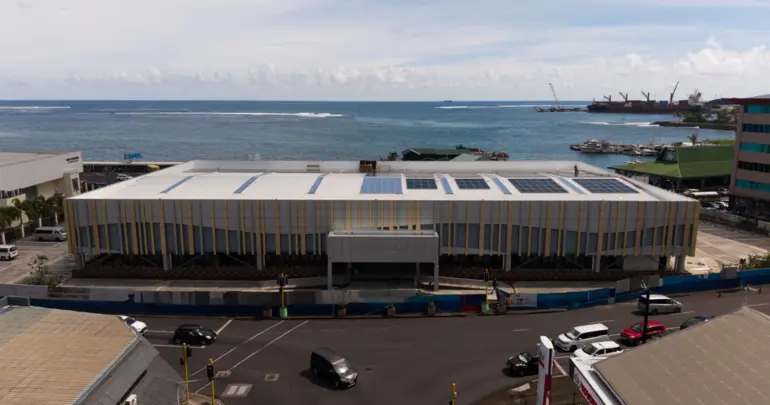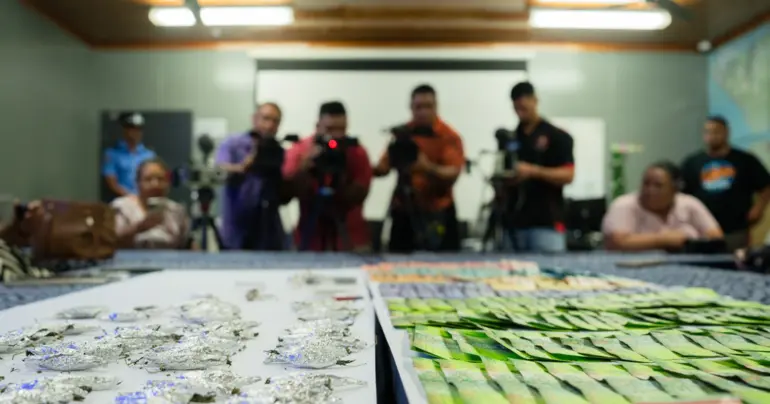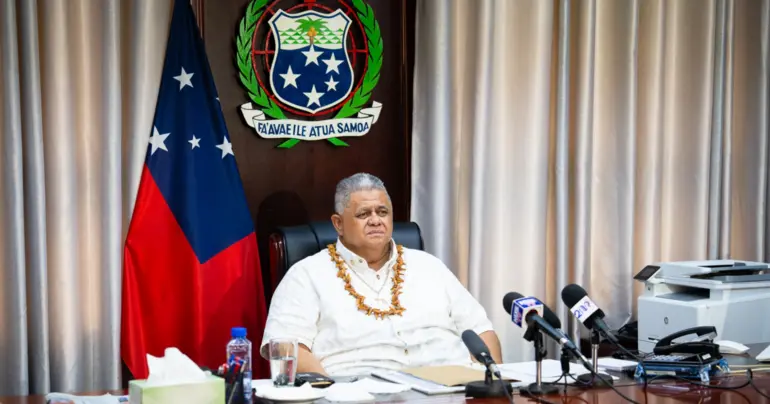Samoa backs call to eliminate cervical cancer
 By Edward Enoka
•
14 December 2019, 10:00AM
By Edward Enoka
•
14 December 2019, 10:00AM
Samoa has joined a call to action by Pacific nations to prevent cervical cancer, noting the high maintenance cases of the disease in the Pacific and the current lack of adequate tests, and treatment like human papillomavirus (H.P.V.) vaccinations.
The call to action was made in Suva Fiji recently where the region discussed the elimination of cervical cancer.
Statistics show that cervical cancer is the number one cancer killing women in developing countries, with incidence rates ranging from 8.2 to 50.7 and age standardized mortality rate from 2.7 to 23.9 per 100,000 women per year in the Pacific alone.
The call to action is in accordance with the World Health Organization’s (W.H.O.) draft targets for 2030, in the Pacific, which are as follows:
- 90% of girls are fully vaccinated against human papillomavirus (HPV) by 15 years of age.
- 70% of women have had an HPV screening test between 30 - 39 years of age and a second HPV test between 40 - 49 years of age (These two tests should be 10 years apart. Clinically validated PCR based tests should be used.)
- 90% of women identified with cervical pre-cancer and cancer have received appropriate treatment and care
The call also supports the principle of equity in striving so that no woman or community is left behind, and for meaningful collaboration between Pacific Island nations in planning, procurement and knowledge sharing.
The agreement also states that raising awareness for cervical cancer, screenings, treatment and training a dedicated workforce are to be implemented across the Pacific for the plans duration.
Pacific Island Governments will be exploring the funding options, medical assistance and cooperation management of the mass outreach program to ensure its success. The Asia Development Bank will be using part of its $7.4 million tala fund for the act, granted to Samoa under its System Strengthening for Effective Coverage of New Vaccines in the Pacific project in November of last year.
The A.D.B. vaccination programme will commence regionally in 2021, with the HPV vaccine being one within the programme and is a Pacific regional programme of which Samoa is included.
The Chief Executive Officer (C.E.O) for the Samoa Cancer Society, Shelley Burich, welcomes the call to action.
“I totally agree and fully support the call to action and its terms as set out by the delegates.”
Ms. Burich told the Samoa Observer the Samoa Cancer Society has been promoting early signs and symptoms and education about cervical cancer for a number of years through its outreach programmes and more recently, with a higher focus, through its’ VAVE campaigns since 2017.
“We will continue to promote and educate on the benefits of the H.P.V. vaccine throughout 2020 and beyond, in doing our bit towards eliminating cervical cancer in Samoa,” she said.
According to data from the Samoa Cancer Society, they have two cervical cancer patients registered for its patient support system and are mainly in the palliative care stage.
But the Society says this is not a true reflection of the cancer’s prevalence in Samoa, and that there have been many women who have presented late and passed away with cervical cancer in recent years.
“Women, who have either presented late for medical advice and treatment or have received a late diagnosis from a health professional - either through slow diagnosis and/or a failing ‘follow-up’ system within our country’s health system.” says Ms. Burich.
The Society says that judging from the data from the N.H.S. Histology results of 2007-2012, there were 12 confirmed cases in 2012 and six in 2016.
While this decrease could be due to improved early detection and treatment, Ms. Burich says that there is a different reality.
“It is most likely because women were not coming forward to get a confirmed and early diagnosis and that women died from cervical cancer or possibly complications relating to cervical cancer, before they had a chance to be diagnosed properly and is most probably the reason for the low presented numbers.”
Ms. Burich told the Samoa Observer that they learned in Sept this year, at a workshop on cervical cancer hosted by the Tupua Tamasese Meaole Hospital Ob & Gynae clinic, that there were 30 women between the ages of 30-60yrs that presented late stages of cervical cancer between Jan-Sept 2019.
The call to action most notably plans the distribution of HPV vaccines for the prevention of cervical cancer.
Following Samoa’s current measles epidemic and the regulations for compulsory vaccinations to be in effect, this new vaccination programme may be another test for our people.
“I believe what is currently happening with the measles epidemic and the compulsory vaccination, should reinforce the message of how important these vaccines are towards saving lives,” Ms. Burich says.
“And in the case of the HPV vaccine, eliminating cervical cancer completely.”
Ms. Burich added that Australia is looking to eliminate cervical cancer by 2028, by starting a free HPV vaccination programme that has seen an 85% reduction in cervical cancer cases since 2007.
“We, in the Pacific region should seriously look at emulating Australia’s commitment and determination in the prevention and elimination of cervical cancer.”
Ms. Burich says that by following their lead in allowing access to vaccines, HPV Screenings and high quality treatment services for pre-cancer and cancer.
Another important issue is the establishment of a registry to keep records of the cancer prevention progress in Pacific Island nations, that may be potentially linked to the set up of a cancer registry.
Ms. Burich says that the Ministry of Health has approved a national cancer registry to be launched soon.
The Ministry of Health currently has patient data on those with cancer and they have recognized and acknowledged a similar need for a national cancer registry. This is something the Samoa Cancer Society says are very proud to have consistently advocated for many years.
“When Samoa is unable to provide this data in discussions about cancer with global organizations such as the International Agency for Research on Cancer (IARC) things worsen.”
That is something Ms. Burich has learned in her experiences at many cancer congresses and leader summits, where she addressed the lack of information coming from the Pacific Islands.
“When they talk about the Pacific region, quite often they would use data from Australia, New Zealand, French Polynesia and they say that’s the Pacific. We deserve to have our data there.”
She reiterates that these programmes are simply the act of undertaking our social responsibility and understanding the importance of starting this conversation by having talks with family and friends who may show signs or symptoms.
"Many years ago the word cancer sort of meant death. What we are trying to say now is that there are alot of people living with cancer successfully. Cancer can be beaten, it is not necessarily a death sentence. It’s about sharing that knowledge and getting people to come forward.”
Ms. Burich also says that by having this sort of response from the public, it highlights what is needed within the hospital system and health sector.
“It’s pinpointing where the gap services are and it’s making them understand by having people come forward and say ‘I want this test’, and with the amount of cancer diagnoses that come through, they are now starting to see that we do have quite a few cancer patients here.”
 By Edward Enoka
•
14 December 2019, 10:00AM
By Edward Enoka
•
14 December 2019, 10:00AM











